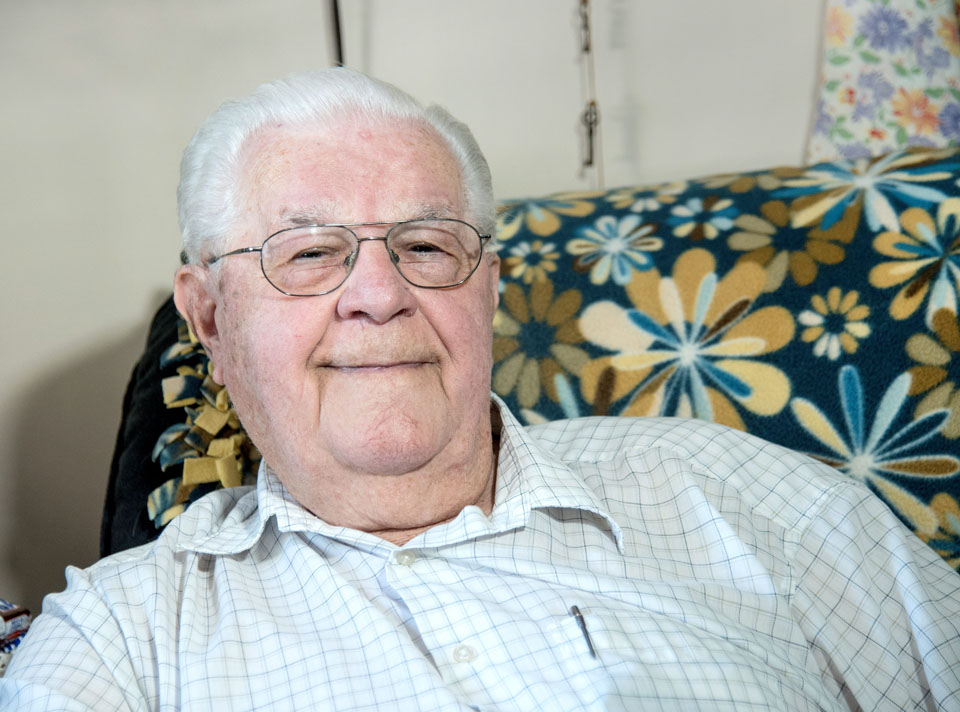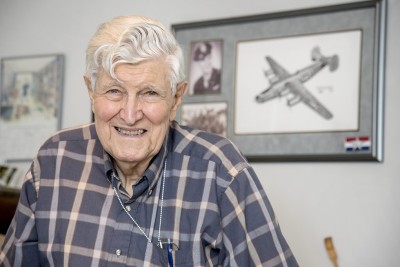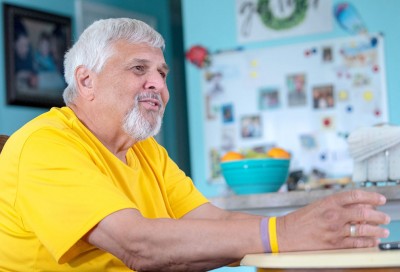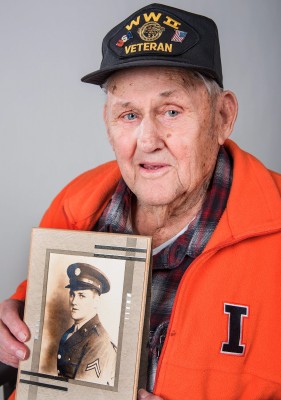Walter E. Schroeder
By Paul Wood

Photo By Rick Danzl/The News-Gazette
FISHER — Right off the ship, joining invading Allied Forces, Walter E. Schroeder found himself caught up in Germany’s last desperate counter-offensive to win World War II.
His troop train was strafed by German pilots. Another 40-by-8 car — 40 men or eight horses — caught on fire. Three men were killed.
Suddenly on the ground, Schroeder himself was under fire, and “one of my buddies got killed right quick by a German sniper” in the Battle of the Bulge.
Now 91, Sgt. Schroeder grew up on a farm near Sadorus. When there still was a Sadorus High School, he played three sports, including softball, because there was no baseball team. He held a long jump record.
His sister Dottie was a more famous athlete, playing from 1943 to 1954 in the All-American Girls Professional Baseball League, and she was a partial inspiration for the 1992 film “A League of Their Own.”
Walter was drafted at 18, and his father died the next month.
After graduation in the summer of 1944 and further training, he was part of a convoy across the North Atlantic, a 14-day trip in waters they shared with German U-boats.
Three ships were lost, he said.
As they approached France in December 1944, Schroeder vividly remembers the overpowering darkness.
“The coast was all blacked out so the U-boats couldn’t get a line on us,” he said.
He joined Company 3, the 99th Infantry in Belgium. That’s where his buddy was shot; “they didn’t find the body for six years,” Schroeder said.
Meanwhile, the Germans had successfully surrounded the 101st Airborne in the Siege of Bastogne. Schroeder recalls the American spirit of optimism and rebellion expressed in one word.
On Dec. 22, German Gen. von Luttwitz sent a demand for surrender to his American equal in Bastogne, Brigadier Gen. Anthony McAuliffe.
McAuliffe’s legendary response to that letter: “NUTS!”
Shortly thereafter, the Allied offensive continued unabated toward Berlin. But on Feb. 4, 1945, Schroeder was seriously injured by wooden and metal splinters during an explosion.
He went from one medical center to another, including Liege and Paris.
“That surgery ended my combat,” Schroeder said, and the war in Europe soon ended.
Later, in a German airfield, “there was the first jet I’d ever seen.”
Also there on the table, there was a parachute sitting out unused.
“I started getting some ideas,” he said, to put that white silk to use. “I had a girlfriend back home.” Later, “my wife’s wedding dress was made out of that.”
His unit was sent back to Le Havre, France. Then, in Frankfurt, Germany, he was assigned to G-2, Intelligence. His office was one floor away from Gen. Dwight Eisenhower.
“I’d never been trained for the intelligence corps, but of course, the war was over. I saw General Ike about every morning. He always had a jeep with a .30 caliber (machine gun) mounted on it,” he said.
Schroeder worked with German prisoners of war. One day, a colonel asked him if he would like to see some of the Nuremberg war criminal trials.
He said sure.
“I sat in on the trials for two days, sat in the press section in the second row,” he said, and was only a few feet from Hermann Goering, the commander of the Luftwaffe.
Hitler deputy “Rudolf Hess was always fidgeting,” Schroeder said.
Schroeder had a long career with the University of Illinois in various positions. He and his wife Dorothy raised three daughters.
Do you know a veteran who could share a story about military service? Contact staff writer Paul Wood at pwood@news-gazette.com.
Read more stories from local veterans:
 Tom Yancey
SAVOY — Serving as bombardier on a B-24 Liberator over Germany, Tom Yancey ran into a lot of flak. Not harsh words, but …
Tom Yancey
SAVOY — Serving as bombardier on a B-24 Liberator over Germany, Tom Yancey ran into a lot of flak. Not harsh words, but …
 David Stangl
CHAMPAIGN — Whether it was protecting state-of-the-art weaponry or chasing after locals who’d broken through the perimet …
David Stangl
CHAMPAIGN — Whether it was protecting state-of-the-art weaponry or chasing after locals who’d broken through the perimet …
 Robert Collins
FARMER CITY — Robert Collins served in Africa and invaded Sicily, then and southern France. He then had to fight his way …
Robert Collins
FARMER CITY — Robert Collins served in Africa and invaded Sicily, then and southern France. He then had to fight his way …